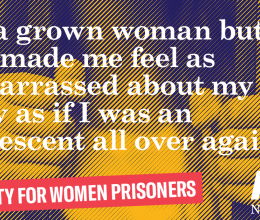
By Scout Richters, Legal & Policy Counsel ACLU of Nebraska
The First Step Act, recently passed by Congress and signed into law by President Trump, included some small but important steps to address the unique needs of America’s incarcerated women. The Pregnancy in Prison project reports that it is unknown how many women incarcerated in the U.S. are pregnant, give birth, have miscarriages, have abortions, have stillbirths or have other pregnancy outcomes. While the project is currently working with county, state and federal correctional facilities to gather data to fill in these gaps, unfortunately no Nebraska facilities provided data. This lack of data is particularly concerning given that women are quickly becoming one of the fastest growing segments of the prison system.
Standing Up for Nebraska’s Incarcerated Women and Girls
The ACLU of Nebraska has exponentially expanded our work to shine a bright light on the unique needs of incarcerated women and girls in Nebraska and devoted our resources to fight for and enact positive reforms in the criminal justice system and to improve conditions of confinement. Far too many incarcerated women are mothers and are serving time for non-violent offenses. After publishing our initial report in the fall of 2017, Let Down and Locked Up: Nebraska Women In Prison, we secured an important victory increasing access to menstrual products for women behind bars.
In March 2018, we sent surveys to all women housed at facilities within the Nebraska Department of Corrections to gain a better understanding of their lives and their experiences in prison and received approximately 60 responses. The results were enlightening and truly gave us greater insight into the lived experiences of Nebraska women behind prison walls. In November, we authored an article in The Nebraska Lawyer magazine detailing the survey responses.
Breastfeeding is a Civil Rights Issue
Breastfeeding is a personal choice for each individual woman to make for herself and her family. We recognize and respect that some women choose not to breastfeed or are unable to breastfeed for a wide variety of reasons. Women who do breastfeed, however, must be supported based not only the individual and public health benefits, but also because breastfeeding is a civil right, gender equity, and reproductive justice issue. Over the last year, we have expanded our work to ensure that Nebraska moms who choose to breastfeed are empowered to know and understand their rights in public, at work and at school.
Lactation policies in Nebraska prisons and jails
In the fall of 2018, we sent open records requests to the Nebraska Department of Corrections, Lancaster County Department of Corrections, and Douglas County Department of Corrections. From each we requested “any and all documents regarding inmate breast pumping, lactation or expression of breastmilk.” Below are excerpts of their responses:
Nebraska Department of Corrections (housing 394 Nebraska women)
All procedures and policies relating to breastfeeding apply specifically to the nursery program at the Nebraska Correctional Center for Women (NCCW).
For example, the Operational Memorandum for the Nursery Program contains a small section detailing feeding and states that a mother can breastfeed with medical approval, proper hygiene must be maintained, and breastfeeding may be done as necessary.
Emails from the Nursery Instructor indicate:
- only women in the nursery program can breastfeed
- those not in the program are not allowed to pump because there is nowhere to store or send the milk
- if a mother is getting released shortly after the birth, she can hand express breastmilk in the shower if she chooses
- nursery moms may breastfeed in the dayroom if they are covered, or they can breastfeed or pump in their room
- breast pumps are available for nursery moms to use and moms in the program get a kit from the hospital that can be used with the equipment available in the nursery program
There are no formal, written policies on breastfeeding relating to NDCS as a whole. This means there is no information about lactation policies for women who are in community corrections or not accepted into the nursery program.
Lancaster County Department of Corrections (housing 102 Nebraska women)
There were no formal, written procedures or policies on lactation at the facility, but an incomplete search of emails1 by the administration did provide information as to ad hoc policies and procedures on the issue for specific women housed at the facility.
One email included an informal policy for an inmate in “C1” who required the use of a breast pump. The email stated that the inmate was not allowed to keep the breast pump in the dorm but had access to the pump when she requested it. The policy was that the inmate be pat searched before and after being taken to a room with an outlet to plug in the breast pump. The door was to be closed, and the inmate was to be checked on periodically. Someone from the public, whose name had been given to staff and with approval of the inmate, retrieved the milk from the facility.
Another email detailed a new I-pod procedure for an individual. The procedure detailed that the individual could have the pump, provided by the inmate’s mother, in her cell and pump whenever she wanted. Someone from the public, whose name had been given to staff and with approval of the inmate, retrieved the milk from the facility.
There was no information about how determinations are made as to what policy should apply to a woman housed at the facility.
Douglas County Department of Corrections (housing 169 women)
Indicated in a phone call on Aug. 30, 2018, that there were no responsive documents.
Conclusion
The American College of Gynecologists and Obstetricians notes adeptly that, “since 1978, the number of women in state prisons has increased nine-fold, growing at more than twice the pace of men. Incarcerated women face unique barriers to health care, and those who are pregnant and postpartum are at increased risk of negative health outcomes. Despite bipartisan support for criminal-justice reform, in many states the health care needs of incarcerated women remain unaddressed.”
The ACLU calls upon Nebraska prison and jail administrators to explore model policies and use those to establish local procedures to ensure Nebraska moms who choose to breastfeed can do so. This would support healthier mothers, healthier children, and a greater respect for breastfeeding as a critical civil rights and civil liberties issue.
